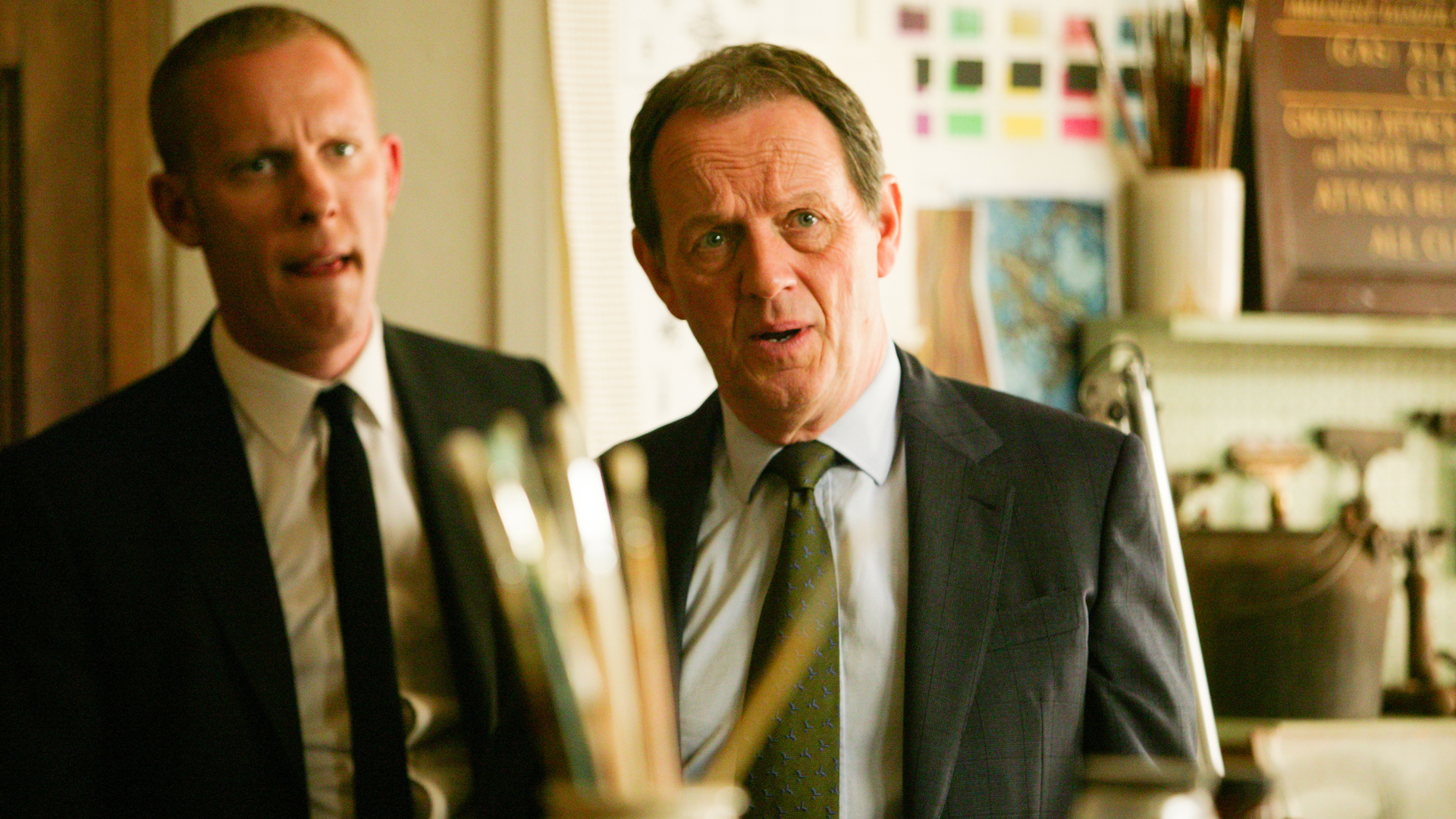 My review of last week's episode: The Lions of Nemea
My review of last week's episode: The Lions of NemeaNeed a MacGuffin to inject drama into your season finale? Add a serial killer with a grudge against your hero!
Let's face it, the story is pretty clichéd, but psychopaths have a way of upping the tension in any story, and it's no different in Beyond Good and Evil.
Graham Lawrie, a Scotsman with a rictus of a face, has been in prison for thirteen years. A newly minted Inspector Robbie Lewis put him away in 2001 for allegedly murdering three policeman with a hammer. Now, fresh evidence has cast the verdict into question, and another murder with an identical method adds further force to Lawrie's appeal.
 |
| Lewis and Hathaway in that one episode where he had hair |
The episode utilizes the Nietzsche angle but doesn't overplay it, effectively exploring how an intelligent psychopath plays with the minds of those around him. Alec Newman makes a suitably chilling Lawrie, slinking about wearing a charmingly reptilian grin, listening to Wagner (wait, what?) and threatening to make Lewis's life miserable.
This episode is difficult to rate. For most of the time, it holds its own, building a plot on two principles that left the audience uncertain. The first of these is a major rule of detective fiction: first person accused din't do it. Therefore there's a real doubt about whether our hero may've got it wrong. Adding to this is the second principle: our hero is fast becoming a sidekick once again.
Now, Hathaway taking the reins is a big positive in my humble opinion. Laurence Fox brings an intensity and intelligence to the leading role that Kevin Whately (bless his 'art) has never managed. The new relationship also creates a strong tension. Lewis is determined to prove Lawrie guilty, even if evidence springs up to contradict him. Hathaway is determined to be fair to all involved, and he can’t just chuck out evidence because of Lewis’s hunch. And Hathaway’s right.
Unfortunately, both these elements are rather canceled out in a cop-out finale that substitutes a barely believable, uninteresting solution for what could have been a remarkably clever crime. The issue of whether Lewis bungled the case falls by the wayside as Hathaway, for no reason whatsoever, credits Lewis’s advice for helping solve the case. A dramatic event halfway through the story doesn’t take it all the way, and the characters’ reactions to it are way too mellow. (SPOILER: When a police officer is attacked, a fellow officer—even someone as Foyle-ish as Hathaway—would fly off the handle if some snot-nosed kid takes that lightly.)
But it’s not all bad. It can’t decide if it’s a thriller or not (ending says not), but when it’s forcing Lewis to break the rules, and Hathaway to contradict his mentor, it provides some genuine thrills and uncertainty. That’s more than we usually see from this show. I'm beginning to like Lizzie, though she's little more than a plot point in this episode.
Should there be another season? Yes. But it should be called Inspector Hathaway.
My review of the next episode: One for Sorrow.
Want something good to watch? Check out my full list of good detective shows.
My review of the next episode: One for Sorrow.
Want something good to watch? Check out my full list of good detective shows.
Hannah Long

SPOILERS FOR THOSE WHO HAVE NOT SEEN THE EPISODE
ReplyDeleteHello! Found your recap from Googling because I was trying to figure out if I missed something or if the writer of this ep dropped the ball or cheated. We're told Lawrie had an alibi for one of the original three murders. But when his accomplice confesses, she says she placed the original police calls, and Lawrie did the deeds. So, what about this alibi that we heard nothing about other than it existed? It was fake? Well, that's a terrible dramatic cheat, if so.
A better conclusion would be if they actually rechecked the alibi (again, I can't believe we hear nothing about the alibi other than it existed!) and found a connection w/ one of the other suspects and that's how they solve the case.
I'd agree. However, as someone commented on the other version of this post (http://www.longview95.blogspot.com/2014/10/inspector-lewis-beyond-good-and-evil.html) - alibis don't just magically disappear in a trial. The alibi recorded was only backed up by Lawrie's word - it was probably fake, or he would've used it in his defense.
DeleteBut from a writing point of view, the fact that they didn't actively attempt to explain this is a huge plot hole. Even if Hathaway could have reasoned out that the alibi was fake, his distrust of Lewis was completely justified, since the latter seemed to be acting on a grudge, instead of real evidence. As his superior officer, he had every right to question his motives, and that he let the whole thing go bothered me. So.
Lewis said the guy who gave the interview who do so for a bottle of booze. I thought it was fake from the beginning.
Delete